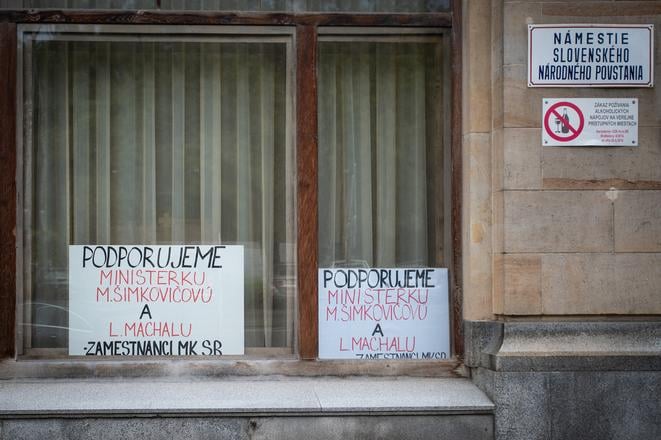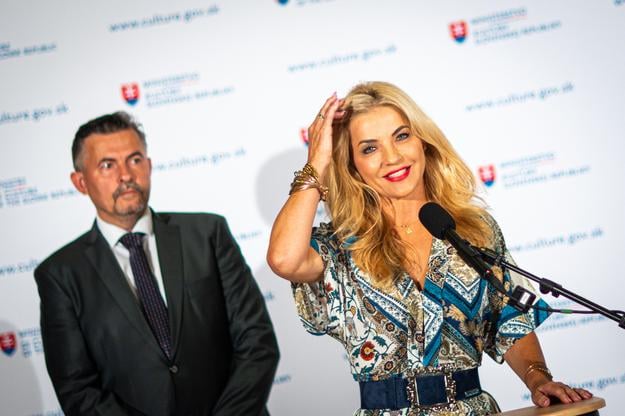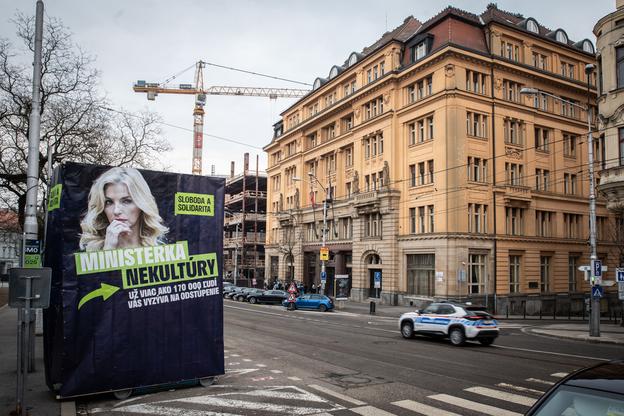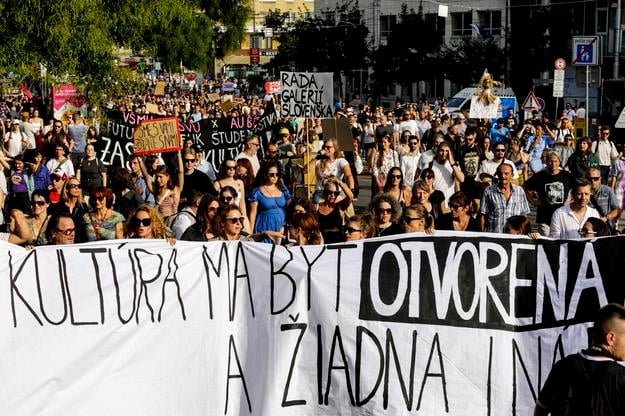This story was produced in partnership withReporting Democracy, a cross-border journalism platform run by the Balkan Investigative Reporting Network.
Two days after a second petition demanding the dismissal of Culture Minister Martina Šimkovičová garnered 125,000 signatures in just 48 hours in August, an unexpected show of support – a song.
Posted by a disinformation site and shared on Šimkovičová’s own disinformation Facebook page, the tune opens with the phrase, “Martina is a minister, still protecting culture.” The page is co-managed with her close ally, Peter Kotlár, a nationalist MP and vocal anti-vaccine advocate who chairs the commission tasked with investigating the previous administration’s alleged mishandling of the coronavirus pandemic.
For the past 11 months, resistance to the minister has steadily mounted after she dismissed several directors of cultural institutions under her ministry, as well as ministry employees, without any clear justification. The ministry has also taken control of independent cultural funds, and criticised and threatened artists, all in an effort to implement a vision outlined by the minister last November.
“Slovak culture must be Slovak and nothing else. We tolerate other cultures, but ours is not a mixture of others,” Šimkovičová said, overlooking the fact that Slovak culture has been shaped by other influences for centuries.
The song on Facebook was not the only sign of support Šimkovičová appeared to garner. On August 20, a week after mass public protests erupted in mid-August against the minister and her pro-Putin chief of staff, Lukáš Machala — who is also a chemtrails conspiracy theorist and is open to the idea that the Earth may be flat — cardboard posters appeared in the windows of the Culture Ministry in central Bratislava. The posters, emblazoned with the message “We support Minister M. Šimkovičová and L. Machala,” were purportedly signed by ministry employees. However, according to the Denník N daily, the posters were actually placed there by Machala himself, along with Peter Grutka, a senior official within the ministry, without employees’ knowledge. Grutka also serves on the board of the Slovak Arts Council, a public body that was once independent but is now under the control of the ministry. It is responsible for distributing funding for cultural projects. The posters coincided with a then ongoing relay protest against the minister and Machala by artists outside the Culture Ministry, dubbed the Slovak Culture Uprising – a nod to the 1944 anti-Nazi Slovak National Uprising (SNP), commemorated annually on August 29.
“When those posters appeared in the window, my colleagues and I had already been fired,” an unnamed former ministry employee told Denník N. The same day the posters appeared in the window, the ministry reportedly dismissed several employees.
Purges at the Culture Ministry
Nearly half of the staff at Slovakia’s Culture Ministry are estimated to have been dismissed or replaced by Machala’s relatives and acquaintances in recent months. About 240 people work at the ministry. On August 20, for instance, the Otvorená Kultúra (Open Culture) initiative reported that 30 experts had been fired in the course of just two days.
More recently, on September 1, the ministry dissolved its creativity and education department, laying off the staff without providing any explanation – an action it currently has the authority to take. On the same day, it also shuttered the Cultural Policy Institute, its analytical centre with seven employees, mirroring similar “cost-cutting moves” by other ministries. Yet, according to Marcel Čas, the former head of the now-abolished institute, the closure wasn’t solely about saving money or managerial decisions. He told the Sme daily that Machala has plans to conduct analyses “differently”.
“The Culture Ministry is entering a state of crisis,” warned Marek Maďarič, a former culture minister for the Smer party who served under Prime Minister Robert Fico, during a recent debate.
Trade union members within the ministry have expressed outrage at the dismissals, accusing the leadership of ousting experts and analysts for personal reasons, as noted in an August letter to Machala. “You are proposing to terminate the contracts of professionals who reported issues of harassment or inefficient management to their superiors,” they wrote. They also criticised the ministry for poor communication. Machala had threatened to fire anyone who would go against him or the minister. According to Čas and other former employees, the fear of dismissal still looms large, paralysing standard processes within the ministry.
“No one makes autonomous decisions anymore because everyone is afraid of how one person [i.e. Machala – Ed.] will wake up feeling,” he told Denník N, describing Machala as a mistrustful and revengeful person who has the final say in everything at the ministry.
“Šimkovičová is just a puppet in the hands of politicians,” Čas has recently told the Sme daily.
Minister Šimkovičová, a notorious homophobe with anti-migrant views, appears unfazed. As her ministry was dismantling departments, she was focused on realising her central vision: the promotion and protection of traditional Slovak culture. She marked the Slovak Day of Kroj, an event celebrating traditional folk costumes, on the first day of September.
“I am immensely proud of our traditions and culture, which are the pillars of our national identity,” she said.
Demolition, yet again
Minister Šimkovičová and her right-hand man, Machala, often appear as an inseparable duo at occasional press conferences where no questions are allowed, a pattern echoed in the disinformation media. After dismissing the directors of the national library and the Bibian gallery for children’s art — the latter is now headed by Šimkovičová’s friend, Petra Flach, following a non-public selection process — they turned their sights over the summer upon two of Slovakia’s flagship cultural institutions: the Slovak National Theatre (SND) and the Slovak National Gallery (SNG). Šimkovičová removed her critics Matej Drlička, the theatre’s director, and Alexandra Kusá, the gallery’s head.
“This is not about personnel changes,” Machala said in August, framing the conflict in broader terms. “The essence of this battle, which we’ve been fighting since the start of our mission, is about the future of Slovak culture.” He criticised liberalism and progressivism, which he views as threats. “We see ourselves as Slovaks, but also as Europeans. However, we will protect our traditional values and steer back towards normalcy. We will not support anything that strays from that norm.”
Šimkovičová, who over the summer accused the LGBT+ community of contributing to Europe’s decline, and Machala defended their decisions to dismiss the two directors, citing alleged managerial failures. Drlička, who had compared the pair to “two runaway train cars”, was blamed for the collapse of a chandelier onto the national theatre stage and the dismissal of the national ballet director, Nina Poláková, whom employees had accused of bullying. In Kusá’s case, the pair cited her alleged neglect of Slovak artists, the absence of a Slovak flag on the gallery building, and a supposed conflict of interest in the gallery’s renovation, which had involved her father’s architectural firm. Previous culture ministers had found no conflict of interest, as the renovation contract had been signed by Kusá’s predecessor.
“The reasons given by the ministry for my dismissal insult not only me but all those who have worked to advance the gallery,” Kusá said.
Despite seizing control of independent cultural funds, purging cultural institutions, accusing artists of political activism, and attacking an NGO promoting democracy and multiculturalism – targeted for its activities and because it carries the name of opposition leader Michal Šimečka’s grandfather – Šimkovičová and Machala weathered summer protests and two parliamentary attempts to remove them. Prime Minister Robert Fico is standing by Šimkovičová, defending her support for Slovak national culture, “not the culture of transsexuals, perversions and vulgarity”, as he described it. He referred to the latest dismissals as routine managerial decisions.
What unfolded over the summer is not unprecedented. In summer 1996, the then culture minister Ivan Hudec, a former communist, similarly dismissed the director of the national theatre, among other things. Artists protested and thousands rallied, yet Hudec remained in office.
Today, the cultural sector also remains resolute. On September 5, the Open Culture initiative declared a “cultural strike” in response to actions by the ministry in recent months. Participating organisations have entered a state of alert and have not ruled out the possibility of a full-scale strike.
Former Slovak president Zuzana Čaputová recently likened the current situation in the cultural sector to “demolition”. Rumours persist that more directors of cultural institutions will be ousted for holding views at odds with those of Machala and Šimkovičová. Others fear censorship in the national gallery or the national theatre’s drama department. Former culture minister Maďarič warns that Šimkovičová and Machala won’t back down until they’ve won.
“It’s their desire to win a battle they’ve declared against contemporary culture, which they see as the enemy,” Maďarič said.





